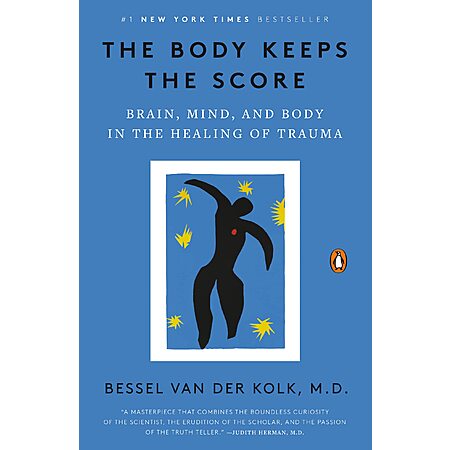expiredphoinix | Staff posted Feb 24, 2025 08:47 PM
Item 1 of 2
Item 1 of 2
expiredphoinix | Staff posted Feb 24, 2025 08:47 PM
The Body Keeps the Score: Brain, Mind, and Body in the Healing of Trauma (eBook)
$2.00
$15
86% offAmazon
Visit AmazonGood Deal
Bad Deal
Save
Share


Leave a Comment
Top Comments
For people with trauma, this book does carry a lot of triggering **** in it, including fairly casual discussions of people's trauma responses to SA, and the like.
It is valuable, but clinicians frequently recommend looking into some of the content before reading, as, while any book about trauma is going to be emotionally challenging, this book doesn't give a lot of consideration to the experience of the reader.
If it helps, great! But it's not wholly accurate.
21 Comments
Sign up for a Slickdeals account to remove this ad.
Our community has rated this post as helpful. If you agree, why not thank LindsInSC
Our community has rated this post as helpful. If you agree, why not thank LavenderDirt1567
For people with trauma, this book does carry a lot of triggering **** in it, including fairly casual discussions of people's trauma responses to SA, and the like.
It is valuable, but clinicians frequently recommend looking into some of the content before reading, as, while any book about trauma is going to be emotionally challenging, this book doesn't give a lot of consideration to the experience of the reader.
Our community has rated this post as helpful. If you agree, why not thank BrainDoc
As background, I have professional expertise in this area and publish research in some areas covered in the book. While this book might be helpful for understanding trauma, the neuroscience of it is not accurate, to put it mildly. Some of the biology described in it is also not accurate. That was enough to put me off from reading it. If the author couldn't get some of the biological sciences and information correct, it made it hard for me to accept what else he was writing.
I don't want to discourage people from buying the book, because some might benefit from it, but read it with an understanding that what he writes about the brain and other aspects of biology might not be not correct. I'm not saying all the neuroscience is wrong, but just accept that it could be wrong.
Edit: See my reply later in this thread for a more in-depth comment.
Our community has rated this post as helpful. If you agree, why not thank Hesstory
As background, I have professional expertise in this area and publish research in some areas covered in the book. While this book might be helpful for understanding trauma, the neuroscience of it is not accurate, to put it mildly. Some of the biology described in it is also not accurate. That was enough to put me off from reading it. If the author couldn't get some of the biological sciences and information correct, it made it hard for me to accept what else he was writing.
I don't want to discourage people from buying the book, because some might benefit from it, but read it with an understanding that what he writes about the brain and other aspects of biology is probably not correct. I'm not saying all the biology is wrong, but just accept that it could be wrong.
If it helps, great! But it's not wholly accurate.
friends, just be wary of advice from comments on the internet. surely some can be trusted, but others can't.
Sign up for a Slickdeals account to remove this ad.
Our community has rated this post as helpful. If you agree, why not thank Savinginthe802
As background, I have professional expertise in this area and publish research in some areas covered in the book. While this book might be helpful for understanding trauma, the neuroscience of it is not accurate, to put it mildly. Some of the biology described in it is also not accurate. That was enough to put me off from reading it. If the author couldn't get some of the biological sciences and information correct, it made it hard for me to accept what else he was writing.
I don't want to discourage people from buying the book, because some might benefit from it, but read it with an understanding that what he writes about the brain and other aspects of biology is probably not correct. I'm not saying all the biology is wrong, but just accept that it could be wrong.
As background, I have professional expertise in this area and publish research in some areas covered in the book. While this book might be helpful for understanding trauma, the neuroscience of it is not accurate, to put it mildly. Some of the biology described in it is also not accurate. That was enough to put me off from reading it. If the author couldn't get some of the biological sciences and information correct, it made it hard for me to accept what else he was writing.
I don't want to discourage people from buying the book, because some might benefit from it, but read it with an understanding that what he writes about the brain and other aspects of biology is probably not correct. I'm not saying all the biology is wrong, but just accept that it could be wrong.
I'm very interested in investigating these inconsistencies, are there any resources you can point me toward to get me started? What about the neuroscience is flawed?
Our community has rated this post as helpful. If you agree, why not thank BrainDoc
Here are a couple examples of incorrect neuroscience from the first few chapters in the book.
The author writes about people "reptile" and "mammal" brains. That's based on an idea a neuroscientist, Dr. MacLean, first wrote about in the 1960s called the "triune brain theory". It gained popularity in Carl Sagan's book, The Dragons of Eden. The problem is that it's not correct. It was little more than a supposition and is not supported by evolution or neuroscience. There are some truths to the idea (we have parts of our brains doing 'simpler' functions), but the overall idea is just not true. It's like the myth from the 1980s that somehow gained some acceptance that we only use 10% of our brains.
The author also writes about the "left" brain and "right" brain in a way that is highly inaccurate. Our cerebral hemispheres have some specialization, but he basically used a pop psychology (and incorrect) way to talk about our brains. It's misleading neuroscience at best.
Again, I didn't read the whole book because after a few chapters of the book, I stopped reading. He didn't get all the neuroscience wrong, but did enough of it that it was hard for me, a neuroscientist, to continue reading. I'm sure there are other inaccuracies in the book. Some people can ignore them, but because they relate to areas I study and publish, it was difficult for me to get through the book.
If people don't want to take my word as an anonymous internet stranger (although I'll say that my username here is accurate), that's understandable. I have not published a formal review of the book -- it's not something I'm interested in doing. I'm offering my input as someone who researches, publishes, and teaches about the brain and various aspects of human behavior including pain, mood, and stress (people will just have to take my word about that, or not, but it is true).
As a neuroscientist reading (part of) the book, it was like this for me. Suppose you are reading a history of the United States and the author wrote, "FDR, the son of Theodore Roosevelt, U.S. president, emigrated from Athens at the age of 23, and became president of the United States during World War I." There are some truths in there (Theodore Roosevelt was a president, he was related to FDR {5th cousins and Eleanor's uncle}, and FDR was a U.S. president during a world war), but overall it's fiction. I'm not being particularly hyperbolic. Some of the neuroscience he wrote about was that inaccurate (e.g., examples I gave above). Even if much of the rest of the book is accurate scientifically, there were enough neuroscience-related red flags to me that I could not finish the book. Again, that doesn't mean it's not a good book, it just has some limitations.
Normally I don't like to link to Wikipedia since I prefer primary sources, but it does link to primary sources offering some critiques (note that I have not read any of these -- I just found them this morning -- so I cannot comment on their accuracy): https://en.wikipedia.or
"However, some scientists have criticized the book for promoting pseudoscientific claims.[26][27] Martin Kristen of The Washington Post criticized Van der Kolk for promoting "uncertain science", such as mirror neurons, the polyvagal theory, and the triune brain model.[28] Similarly, Peter Barglow, writing for the Skeptical Inquirer, criticized him for endorsing controversial treatments, including EMDR and emotional freedom technique."
I should note that reference 26 isn't specifically about the book (it came out years before he wrote the book), but it's an article that suggests that some of his claims about trauma and memory are not really clear enough based on the scientific evidence.
A final thought. Some of what he does is suggest that his book is how things really are. He's much more confident than much of the scientific evidence allows. I understand that tendency when communicating with a broader audience, but all he needed to do was simply rephrase some sentences in his book.
Again, I agree that the book is helpful to many people and is, for many people, worth reading and understanding. I simply offer my expertise to say he doesn't get all the science correct.
I'm very interested in investigating these inconsistencies, are there any resources you can point me toward to get me started? What about the neuroscience is flawed?
I should add that I'm not questioning the usefulness or helpfulness of the book, I'm just stating that some of the neuroscience and biology of it are not correct.
Sign up for a Slickdeals account to remove this ad.
Leave a Comment